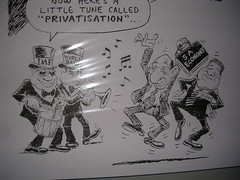
we won't eat rhetoric, we need to eat food

On the ninth day of the South African day, As we walked down the allegedly most dangerous streets of Johannesburg (given all of us were wearing Primani there wasn’t much hope for anyone mugging us), I noticed a graffiti mural of the trade union federation COSATU just outside their headquarters, with a tag on their “living wage campaign”. First London now the world I thought, let’s take this global!
We met the International Secretary of COSATU who gave us the history of the federation, formally established as a non-racial organisation in 1985 mobilising as part of the struggle for freedom with a militant internationalism, as black workers weren’t allowed to bargain until 1980. Before that, they would organise informally within a context of contradictory interests within the anti-apartheid struggle between the SAC who were the leaders of the revolution – “the first to sacrifice, the last to leave” – and the ANC who became the political head of the struggle. Most people joined the trade union movement not through being taught theory but experiencing exploitation.
Now however, many workers do not trust the ANC arguing that “we won't eat rhetoric, we need to eat food”. The trade unionist explained there was a two tier labour market between secure and casualised employment and no legal minimum wage.
A “cappuccino effect” has been created with a sprinkling of black elites at the top covering a mass of white elites. Indeed, blacks still control only about 10% of the Johannesburg Stock Exchange, despite consisting of 80% of the population. Black Economic Empowerment does ensure that there are 50% of blacks in the boardroom, but systematically whites remain as majority stakeholder. Similarly, access to education is still based on apartheid not through law but through income. They were very concerned that if ANC keep going along on the gravy train, they will eventually fall.
They do strongly mobilise with civil society linking up through the Jobs Front, which seems their equivalent to London Citizens.
 One of three trade union federations, along with NATU and FETU, they have a membership of 1.9 million members. Their international agenda is articulated through the Programme for Minimum Practice for Working Class Internationalism, focusing on
One of three trade union federations, along with NATU and FETU, they have a membership of 1.9 million members. Their international agenda is articulated through the Programme for Minimum Practice for Working Class Internationalism, focusing on- Trade, socio-political and environmental justice
- Working class solidarity
- Capacity building
They use a three-pronged approach in campaigning for solidarity
- strategic analysis of the world: what are the balance forces?
African economies are more closely linked to the West than to each other and in South Africa, raw materials leave the country and finished products return, thus squeezing the economy of its resources. In effect, for every $1 that the West gives in aid, Africa gives $3 back in trade.
technical and operational mechanisms: how can we influence international institutions like the UN, IMF or WTO
They are lobbying internationally against the Economic Partnership Agreements (EPAs). They advised us to challenge trade unions in Europe and the US on this issue to show real solidarity with African workers.
They also argued on the paradox of NGOs. Many respond to priorities developed in the West through a project management approach which makes them more responsive than pro-active and leaves local groups isolated as they don’t fit into the bid frameworks developed by the NGOs.
- practical projects: solidarity on human rights, health and education – focusing on Burma, Cuba, Nigeria, Palestine, Swaziland, TImor and Zimbabwe
 Through acting as a quasi diplomatic arm for the African trade union movement, they can lobby Brussels over EPAs and the role of Chinese companies in Africa and at the same time work with progressive forces across Europe.
Through acting as a quasi diplomatic arm for the African trade union movement, they can lobby Brussels over EPAs and the role of Chinese companies in Africa and at the same time work with progressive forces across Europe.They also mobilising in areas where the recent xenophobic attacks took place, organising rallies and delivering leaflets in the various local languages spoken, trying to calm down the tensions and racism. Indeed the worst victims were from Zimbabwe and Mozambique, a country who despite enjoying 8% of economic growth, still suffers from terrible inequality. This brought the question that if Zimbabwe became democratic, there would still be a long journey until there was greater equality. COSATU have applied to work as observers in Zimbabwe, independent of the South African government.








0 comments:
Post a Comment